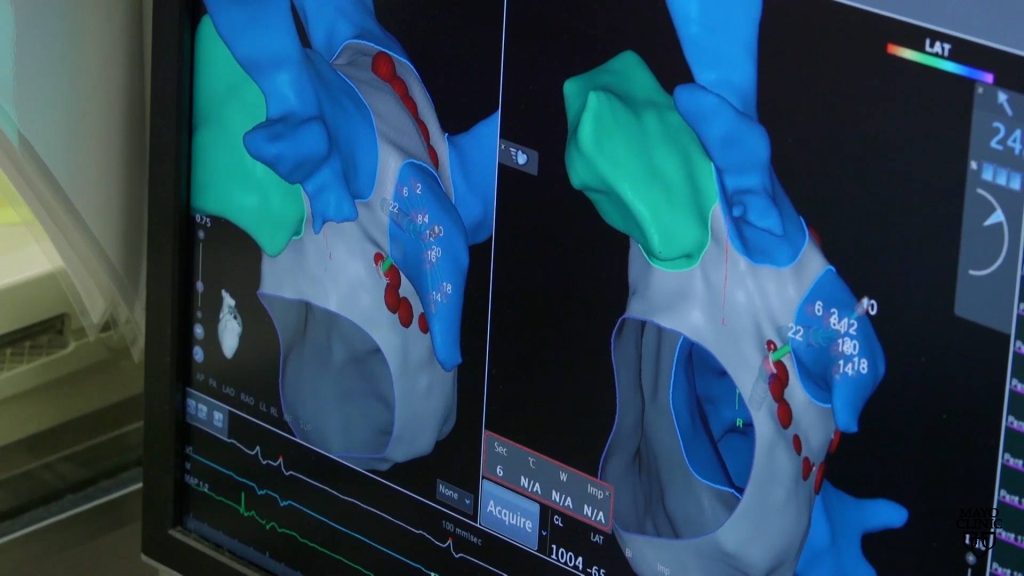-
Featured News
Using AI in radiology clinical practice

Mayo Clinic is combining artificial intelligence (AI) and machine learning with clinical practice to improve care. AI is intelligence exhibited by machines, and it's being used at Mayo Clinic to program computers to process and respond to data quickly and consistently for better treatment outcomes.
These technologies complement the knowledge of doctors. Radiology was one of the first areas that saw a lot of AI applications.
Watch: Using artificial intelligence in clinical practice.
Journalists: Broadcast-quality video (1:53) is in the downloads at the end of this post. Please "Courtesy: Mayo Clinic News Network." Read the script.
Using AI in health care seems like a futuristic concept, but it's something that's being used to complement the knowledge of doctors. Radiology was one of the first areas that saw a lot of AI applications.
"Radiology has had the lead, partly because AI is driven by data, and radiology has a lot of digital data already ready to be used by AI."
Dr. Bradley Erickson, director of Mayo Clinic's AI Lab, says in the case of radiology, machine learning is used to complete some of the more time-consuming work.
"It's actually doing a lot of the more mundane work like tracing tumors and tracing structures. Measuring the amount of fat and muscle in body CTs is another example," says Dr. Erickson. "If a computer can do that first pass, that can help us a lot."
Beyond that, the diagnostic capabilities of AI are what attract a lot of the appeal.
"We also use it for some diagnostic purposes — for instance, to help detect intracranial aneurysms, intracranial stroke and pulmonary embolism. And we also use it for identifying some potential molecular markers."
While imaging-related AI has seen a lot of advancements, Dr. Bhavik Patel, director of AI at Mayo Clinic Arizona, says the next step is looking at AI applications for preventive health and shifting the mindset from pipeline to platform thinking.
"We have an AI model now that can incidentally say, "Hey, you've got a lot of coronary artery calcium in your heart, and you're at high risk for a heart attack or stroke in five years." And you might not have otherwise known that. Now that we've detected this, and we can see in your electronic medical record that you're not seeing a primary care physician and you're not on a cholesterol-lowering medications, let's get you plugged in with specialized care providers within Mayo Clinic to do further workup. In this way, we are more proactive and not reactive by waiting for that patient to come back to us in the future with a heart attack or stroke — both preventable events," says Dr. Patel.
There is a broad area of applications (for AI), starting in radiology, but really spreading into the rest of the clinic, including cardiology and even pathology.
Both Dr. Erickson and Dr. Patel took part in a panel discussion about AI Adoption for Clinical Practice during the Mayo Clinic Platform Conference this past July. In addition to Dr. Erickson and Dr. Patel, the panel included other Mayo Clinic experts:
- Dr. Carlos Mantilla, Dept, Chair, Anesthesiology and Perioperative Medicine
- Dr. Francisco Lopez-Jimenez, Division Chair, Dept. of Preventive Cardiology
- Dr. Clark Otley, Chief Medical Officer, Mayo Clinic
Watch the panel discussion: AI Adoption for Clinical Practice
Related posts:
- Mayo Clinic Q&A podcast: Cardiology pumps AI into patient care
- Mayo researchers use AI to detect weak heart pump via patients’ Apple Watch ECGs
- Mayo Clinic Platform_Accelerate program begins with four AI startups
____________________________________________
For the safety of its patients, staff and visitors, Mayo Clinic has strict masking policies in place. Anyone shown without a mask was either recorded prior to COVID-19 or recorded in a nonpatient care area where social distancing and other safety protocols were followed.







